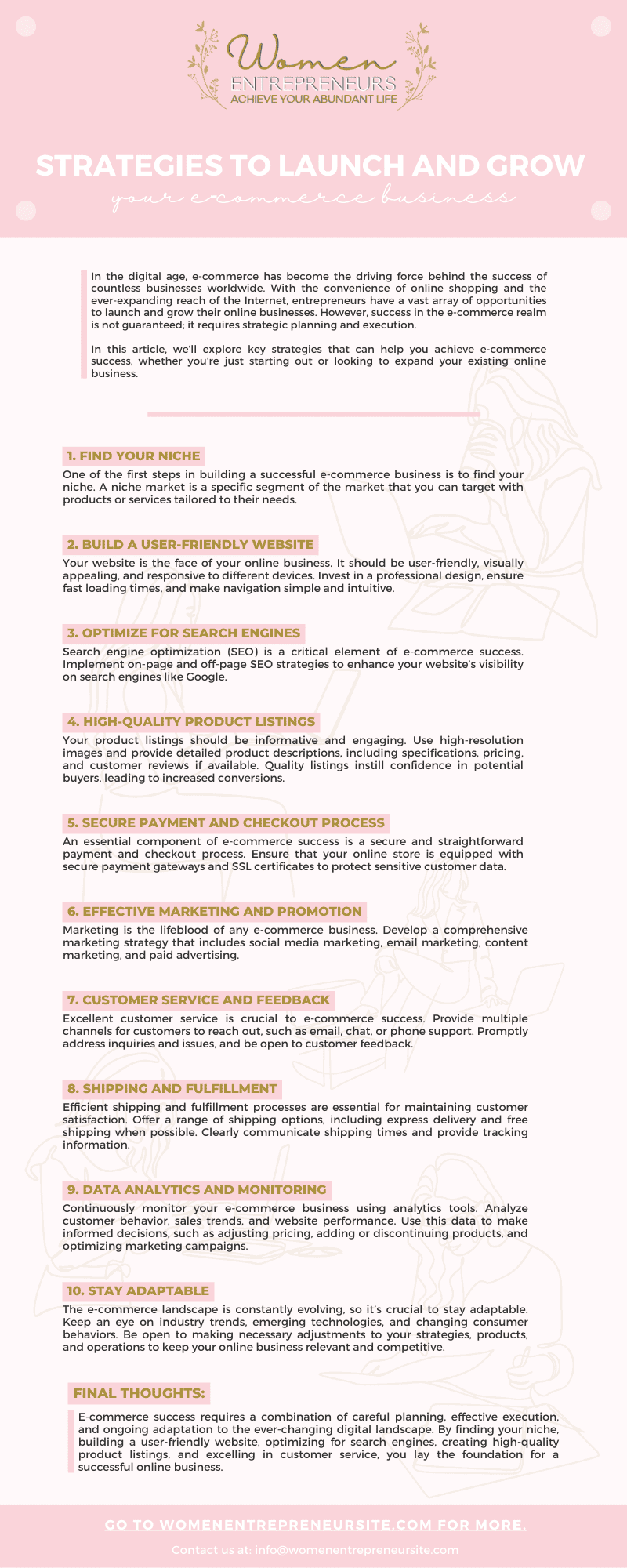In the realm of professional growth, there comes a pivotal moment for many individuals when the…
Strategies to Launch and Grow Your E-commerce Business

In the digital age, e-commerce has become the driving force behind the success of countless businesses worldwide. With the convenience of online shopping and the ever-expanding reach of the Internet, entrepreneurs have a vast array of opportunities to launch and grow their online businesses. However, success in the e-commerce realm is not guaranteed; it requires strategic planning and execution.
In this article, we’ll explore key strategies that can help you achieve e-commerce success, whether you’re just starting out or looking to expand your existing online business.
Bluehost will help you with:
- Setting up your online store
- Adding products
- Customizing features
- Utilizing plug-ins
1. Find Your Niche
One of the first steps in building a successful e-commerce business is to find your niche. A niche market is a specific segment of the market that you can target with products or services tailored to their needs. By identifying a niche, you reduce competition and increase the chances of finding a dedicated customer base. Research your chosen niche thoroughly to understand its demands and preferences. This understanding will help you source or create products that cater to the unique needs of your target audience.
2. Build a User-Friendly Website
Your website is the face of your online business. It should be user-friendly, visually appealing, and responsive to different devices. Invest in a professional design, ensure fast loading times, and make navigation simple and intuitive. A well-structured and secure website builds trust and encourages visitors to explore your offerings and make purchases.
3. Optimize for Search Engines
Search engine optimization (SEO) is a critical element of e-commerce success. Implement on-page and off-page SEO strategies to enhance your website’s visibility on search engines like Google. Use relevant keywords, optimize product descriptions, and earn backlinks from authoritative websites. Effective SEO will help potential customers find your website when they search for products in your niche.
4. High-Quality Product Listings
Your product listings should be informative and engaging. Use high-resolution images and provide detailed product descriptions, including specifications, pricing, and customer reviews if available. Quality listings instill confidence in potential buyers, leading to increased conversions.
5. Secure Payment and Checkout Process
An essential component of e-commerce success is a secure and straightforward payment and checkout process. Ensure that your online store is equipped with secure payment gateways and SSL certificates to protect sensitive customer data. Simplify the checkout process, offering multiple payment options to accommodate a variety of customer preferences.
Mind Your Business
Mind Your Business is a comprehensive guidebook that equips aspiring entrepreneurs with everything they need to know to establish a successful business from the ground up. This all-inclusive resource covers all aspects of the process, from developing your brand and product design to identifying legal and tax requirements.
6. Effective Marketing and Promotion
Marketing is the lifeblood of any e-commerce business. Develop a comprehensive marketing strategy that includes social media marketing, email marketing, content marketing, and paid advertising. Utilize social media platforms to engage with your audience and promote your products. Email marketing can be a powerful tool for building customer relationships and driving repeat business.
7. Customer Service and Feedback
Excellent customer service is crucial to e-commerce success. Provide multiple channels for customers to reach out, such as email, chat, or phone support. Promptly address inquiries and issues, and be open to customer feedback. Happy customers are more likely to become repeat buyers and brand advocates.
8. Shipping and Fulfillment
Efficient shipping and fulfillment processes are essential for maintaining customer satisfaction. Offer a range of shipping options, including express delivery and free shipping when possible. Clearly communicate shipping times and provide tracking information. Streamline your inventory management and order fulfillment processes to minimize delays.
9. Data Analytics and Monitoring
Continuously monitor your e-commerce business using analytics tools. Analyze customer behavior, sales trends, and website performance. Use this data to make informed decisions, such as adjusting pricing, adding or discontinuing products, and optimizing marketing campaigns.
10. Stay Adaptable
The e-commerce landscape is constantly evolving, so it’s crucial to stay adaptable. Keep an eye on industry trends, emerging technologies, and changing consumer behaviors. Be open to making necessary adjustments to your strategies, products, and operations to keep your online business relevant and competitive.
Final Thoughts
E-commerce success requires a combination of careful planning, effective execution, and ongoing adaptation to the ever-changing digital landscape. By finding your niche, building a user-friendly website, optimizing for search engines, creating high-quality product listings, and excelling in customer service, you lay the foundation for a successful online business.
Additionally, effective marketing, secure payment processes, and efficient shipping and fulfillment are key components of sustainable growth. By staying adaptable and making data-informed decisions, you can continue to thrive in the dynamic world of e-commerce. With dedication, patience, and the right strategies, you can launch and grow a successful online business.








